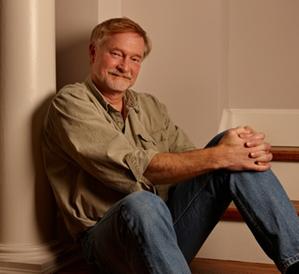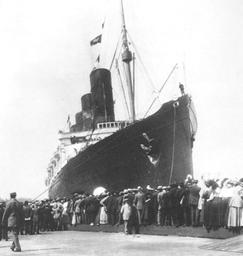 Erik Larson is the author of four national bestsellers: In the Garden of Beasts, Thunderstruck, The Devil in the White City and Isaac's Storm, which have collectively sold more than 5.5 million copies. His books have been published in 17 countries. Larson began his writing career as a journalist, and now gets to travel the world researching his works of nonfiction. [You can read a longer and surprisingly hilarious bio written by the man himself here.]
Erik Larson is the author of four national bestsellers: In the Garden of Beasts, Thunderstruck, The Devil in the White City and Isaac's Storm, which have collectively sold more than 5.5 million copies. His books have been published in 17 countries. Larson began his writing career as a journalist, and now gets to travel the world researching his works of nonfiction. [You can read a longer and surprisingly hilarious bio written by the man himself here.]
To begin, my mother made me promise I'd ask: how do you choose the diverse subjects of your books? What makes for a compelling story that you feel driven to tell? Why the Lusitania?
Well, you tell your mother it's none of her business. Actually, no, please tell her that, really, I have no idea. There's more truth to that than I care to admit. The hunt for each book idea is a hard one for me, and typically takes about a year. To write the kind of history I write, I need to find real-life events that lend themselves to being told as stories--true stories--with beginnings, middles and ends. There has to be a clear, ascending narrative arc, and there has to be a rich enough trove of archival materials to make the story and characters come alive without massaging the facts. And, it has to be something I want to spend the next few years working on. I often think finding that next idea is like finding a spouse--you have to kiss a lot of frogs before you find one that kisses back.
What drove me to write about the Lusitania was the potential it offered for nonfiction story-telling--for crafting a narrative full of real-life suspense. A nonfiction maritime thriller. The archival base was extraordinarily rich, full of elements that I felt no one else had adequately mined--all the things I love to work with: telegrams, diaries, love letters, secret documents, even the German submarine commander's hour-by-hour war log. It doesn't get any better than that. Whether I succeeded, of course, is for readers to decide.
Aside from the obvious choices to concentrate on Captain Turner and Kapitänleutnant Schwieger, how did you choose the individual stories to follow? Were they (Charles Lauriat, Dwight Harris, Theodate Pope, etc.) simply the ones who left behind the most documentation?
Exactly! The three you cite all left vivid, detailed accounts, especially Lauriat, who wrote a book on the subject, and in addition left a broad and deep documentary trail. I also liked the fact that Lauriat was a famous bookseller. How nice that a time once existed when a bookseller could become famous and travel in first class on Cunard ships and be recognized on sight. As for Pope, I found her backstory particularly compelling: her depression, her interest in the supernatural, the fact she was a pioneering female architect and pal of Henry James and that she was in that cadre of American women who were first to embrace their identity as feminists, back when the term itself was brand new.
You state in your "Note to Readers" that you are very careful to stick to the facts, with no embellishment. And yet your narrative is incredibly lively. Please explain the importance of that rule for you--the integrity of pure fact--and how you make the bare truth so gripping.
They key lies in detail. There are no shortcuts--you have to do the necessary digging to find the bits and pieces that will ignite the reader's imagination. It's the reader, I'm convinced, who does the animating of my narratives. I just present the details necessary to allow that to happen. For example, I often have people tell me that I must have made some things up, because I have actual dialogue in my books. But in fact, if there is dialogue, it's pulled directly from some actual historical document, like a letter, or memoir, or newspaper interview. More often than not, however, what they point to isn't even dialogue--it just seems to be dialogue, and reads that way in their imagination. Which is wonderful. The human mind loves to connect dots and finish sentences and make disparate bits of information seem like a coherent whole.
 What do your processes of research and writing look like, and are they in fact two separate processes? What's the most enjoyable part for you?
What do your processes of research and writing look like, and are they in fact two separate processes? What's the most enjoyable part for you?
They are two separate processes that merge in the middle. Ideally I'd like to have all my research done before I start to write, but that never happens. Invariably I reach a point where the book just has to come out. It's like how my wife describes pregnancy: get this baby out of my body, NOW. Passages come to mind, and I start writing. At first I'll just write them in my journal--I keep a journal for each book--then I'll start writing things in a computer file called "Passages." Then I enter my page-a-day mode, where I get up early, and write a single page before breakfast, and then return to my research for the rest of the day. Pretty soon the writing supplants the research almost entirely--although the research really never ends, because you always end up having to check things. What did early NYC street lamps look like? What was the weather like on a particular day? What were people reading in the newspapers in New York on the day the Lusitania departed? That kind of thing.
How do you keep so many characters and events in such a complex world history straight?
The most powerful tool is chronology. Before I start to write, I build a chronology that contains every worthwhile fact that I've mined from archives, books and whatever, with each item coded in such a way that I can readily find the source document in my files. This chronology becomes a de facto outline, with various events clumping at various points, and with each character's role clearly defined. Using this as a spine, I craft the first draft. Then, I lay the whole thing out on the floor of our bedroom and, using a scissors and tape, I literally cut everything up and move it around, hunting for the most natural structure, while hoping that no one will open a window at the wrong moment. Once my dear departed dog, Molly, walked across the manuscript for Thunderstruck. Luckily only one small passage was displaced--it wound up on the balcony outside my bedroom.
What are you or will you be working on next?
I'm exploring a possible idea. This is early for me, so, being a pessimist, I'm pretty sure the idea won't pan out. But I'm writing a test proposal. I won't say what the subject is, because I never talk about works in progress until they're done. It's very annoying for my friends and family, though my wife and daughters all know early on. The proposal is a draft of what I would eventually send my agent, and which he in turn would send to my publisher, and which ideally my publisher would love so much that she would spend gobs of money to acquire it. Doing a proposal is a good test of an idea's strength. If you get through the process--writing an opening chapter, an overall description and a chapter outline, maybe 80 to 100 pages in all--you have a pretty good sense that it's a viable idea and that halfway through you won't hang yourself from boredom. --Julia Jenkins

